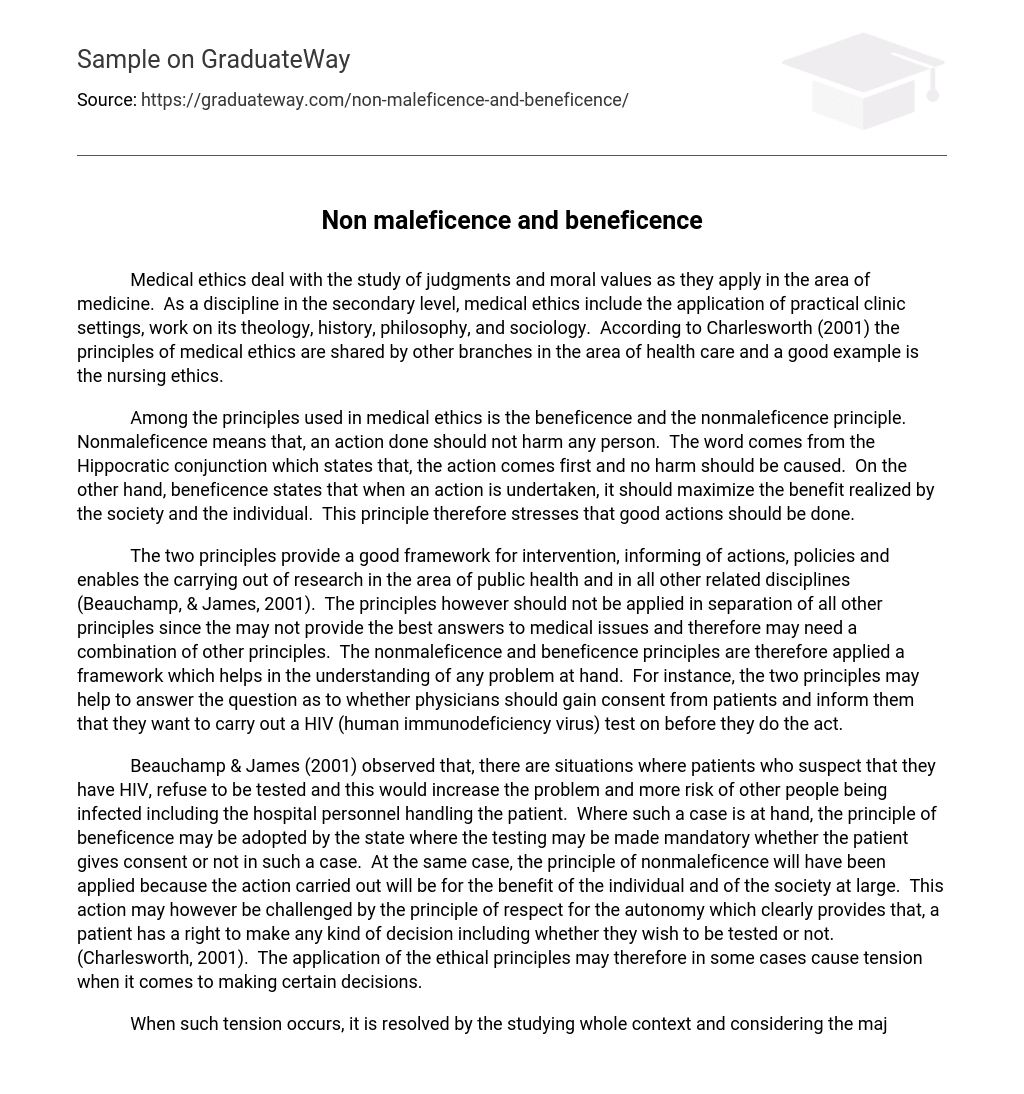Medical ethics deal with the study of judgments and moral values as they apply in the area of medicine. As a discipline in the secondary level, medical ethics include the application of practical clinic settings, work on its theology, history, philosophy, and sociology. According to Charlesworth (2001) the principles of medical ethics are shared by other branches in the area of health care and a good example is the nursing ethics.
Among the principles used in medical ethics is the beneficence and the nonmaleficence principle. Nonmaleficence means that, an action done should not harm any person. The word comes from the Hippocratic conjunction which states that, the action comes first and no harm should be caused. On the other hand, beneficence states that when an action is undertaken, it should maximize the benefit realized by the society and the individual. This principle therefore stresses that good actions should be done.
The two principles provide a good framework for intervention, informing of actions, policies and enables the carrying out of research in the area of public health and in all other related disciplines (Beauchamp, & James, 2001). The principles however should not be applied in separation of all other principles since the may not provide the best answers to medical issues and therefore may need a combination of other principles. The nonmaleficence and beneficence principles are therefore applied a framework which helps in the understanding of any problem at hand. For instance, the two principles may help to answer the question as to whether physicians should gain consent from patients and inform them that they want to carry out a HIV (human immunodeficiency virus) test on before they do the act.
Beauchamp & James (2001) observed that, there are situations where patients who suspect that they have HIV, refuse to be tested and this would increase the problem and more risk of other people being infected including the hospital personnel handling the patient. Where such a case is at hand, the principle of beneficence may be adopted by the state where the testing may be made mandatory whether the patient gives consent or not in such a case. At the same case, the principle of nonmaleficence will have been applied because the action carried out will be for the benefit of the individual and of the society at large. This action may however be challenged by the principle of respect for the autonomy which clearly provides that, a patient has a right to make any kind of decision including whether they wish to be tested or not. (Charlesworth, 2001). The application of the ethical principles may therefore in some cases cause tension when it comes to making certain decisions.
When such tension occurs, it is resolved by the studying whole context and considering the major issue. It is important to note that, ethical analysis is not to be conducted by use of any form of a checklist. According to Beauchamp, & James (2005), what is supposed to be done is a thoughtful appraisal by looking at the most important issues which may be of concern to the society, and giving the first consideration to such issues.
A distinction in context is made between public health practice and the public health research areas. A good case to explain this is where studies are carried out in the research of broader health forms of determinants, for example to consider whether the social factors are of any benefit. However, while a connection is made between health records and the tax records, a rich and reliable data may be attained. Despite the achievement of such a method of interacting records, such method of research is not allowed in the medical field. When it comes to the practice area in the investigation of the communicable diseases, the approach which dominates is the utilitarian approach. When it comes to research, the principle which govern the privacy of the individual is given precedence over the utility aspect. While it comes to the practice of public health however, utility is given the first consideration and takes precedence as opposed to the principle of observing privacy.
More often, the two principles rather than providing a real solution to the problem at hand, they illustrate tension to the complex questions of ethics. This in fact should be the case. There is a lot of complexity and dynamic issues concerning the human interactions. There is therefore need to put in place proper judgments to deal with such complex issues. The rules which govern people should not be rigid as human behavior is not to be compared with other normal objects or machines. Parker (2006) posited that, there is need for medical practitioners to learn proper methods of doing ethical analysis so as to come up with accurate decisions concerning the medical ethics.
The two principles, the nonmaleficence and the beneficence have for a long time been used to provide a good framework for intervention, informing of actions, policies and enables carrying out of research in the area of public health and in all other related disciplines. However the two of them cannot apply effectively without considering the other important principles when dealing with the complex issue of providing a solution to the medical issues which may need the application of ethics in order to come up with a solution.
References
Charlesworth M. (2001). Bioethics in a Liberal Society. Cambridge: Cambridge University Press.
Beauchamp, L., & James F. (2001). Principles of Biomedical Ethics. Oxford: Published by Oxford University Press
Parker M. (2006). The Cambridge Medical Ethics. Cambridge: Cambridge University Press.





